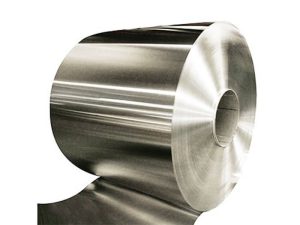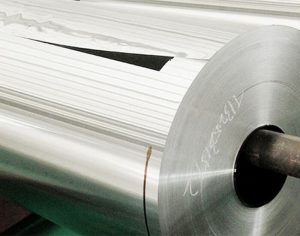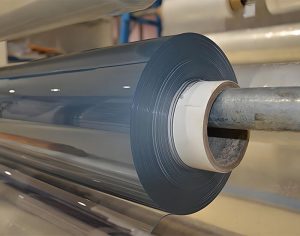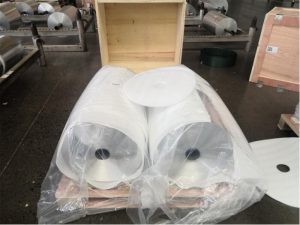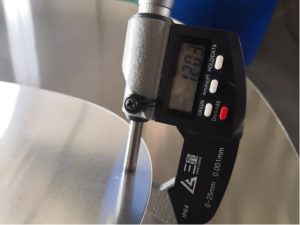At Huasheng Aluminum, we specialize in producing and wholesaling high-quality Aluminium Foil for Air Conditioners, which is an essential component in modern air conditioning systems. Our aluminum foils are engineered for optimum performance, providing enhanced thermal conductivity, corrosion resistance, and energy efficiency for a variety of HVAC applications.
Aluminium Foil Specifications for Air Conditioning Systems
At Huasheng Aluminum, we offer a wide range of aluminium foil specifications to meet the diverse needs of air conditioning systems.
General Specifications
| Attribute |
Details |
| Product Name |
Air Conditioner Aluminium Foil |
| Alloy |
1100, 1200, 3102, 8011 |
| Temper |
H22, H24, H26 |
| Thickness |
0.02-0.05mm |
| Width |
200-1450mm |
| Length/Weight |
Customized |
| Inner Diameter |
76mm or 152mm |
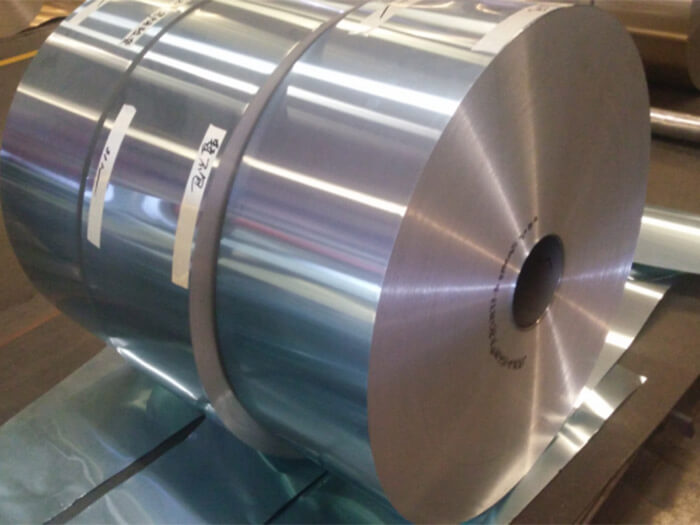
Why Use Aluminium Foil in Air Conditioners?
Aluminium foil is widely used in air conditioning systems for several reasons:
- High Thermal Conductivity: Aluminium is an excellent conductor of heat, which allows air conditioners to transfer heat efficiently between the refrigerant and the air.
- Corrosion Resistance: Modern air conditioning units are exposed to varying environmental conditions, including moisture and chemicals. Aluminum foil’s natural corrosion resistance, especially with anti-corrosive coatings, ensures longevity.
- Lightweight: Aluminium is a lightweight material, making it easy to install and reducing the overall weight of air conditioning units.
- Malleability: Aluminium foil can be easily shaped into fins and other complex designs without losing its strength, making it ideal for heat exchangers.
Alloy-Specific Specifications
1100/1200 Aluminium Foil
| Application |
Heat exchangers, evaporators |
| Unique Advantages |
High strength, good machinability |
| Thickness |
Generally 0.1-0.3mm |
| Processing Considerations |
Maintain temperature and humidity during processing |
8011 Aluminium Foil
| Application |
Refrigerant pipes, outdoor unit casings |
| Unique Advantages |
Good machinability, high strength |
| Thickness |
Generally 0.08-0.2mm |
| Processing Considerations |
Soft, easy to shape and process |
3102 H26 Aluminium Foil
| Application |
Condenser and evaporator fins |
| Unique Advantages |
High mechanical strength, efficient heat dissipation |
| Temper |
H26, fully hardened state |
Types of Aluminium Foil for Air Conditioning Systems
Bare Aluminium Foil
| Application |
Wrapping coils, insulation |
| Alloy and Temper |
1100 or 1200, O temper |
| Advantages |
Cost-effective, basic protection |
| Disadvantages |
Limited protection against corrosion and moisture |
Hydrophilic Aluminium Foil
| Application |
Fins and coils, improves heat transfer and prevents corrosion |
| Alloy and Temper |
8011, H24 temper |
| Advantages |
Improved heat transfer, corrosion prevention |
| Disadvantages |
Coating wear over time |
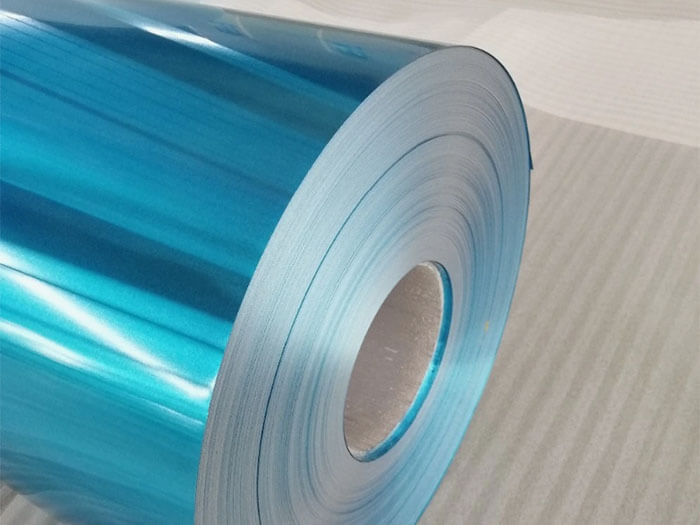
Hydrophobic Aluminium Foil
| Application |
Prevents water accumulation on components |
| Alloy and Temper |
Similar alloys as hydrophilic foil, often 8011, H24 temper |
| Advantages |
Prevents water-related issues, improves system efficiency |
| Disadvantages |
May wear over time, effectiveness can vary |
Epoxy-Coated Aluminium Foil
| Application |
Air conditioning ducts and panels for durability and corrosion prevention |
| Alloy and Temper |
Typically alloys like 3003, H22 or H24 temper |
| Advantages |
Increased corrosion resistance, enhanced durability |
| Disadvantages |
Potential for cracking or chipping of epoxy coating under stress |
Pre-Coated Aluminium Foil
| Application |
Air conditioning ducts for insulation and preventing air leaks |
| Alloy and Temper |
Often 1100, 1200 or 8011, with a variety of tempers |
| Advantages |
Enhanced insulation, reduced air leakage, protection against condensation |
| Disadvantages |
Coating may degrade over time, affecting performance |
Laminated Aluminium Foil
| Application |
Insulation and improved heat transfer efficiency in air conditioning systems |
| Alloy and Temper |
Multiple alloys can be used, often chosen based on required characteristics |
| Advantages |
Enhanced insulation, improved heat transfer efficiency, customization options |
| Disadvantages |
Thicker material may affect space constraints, requires careful lamination |
Mechanical Properties of Air Conditioner Aluminium Foil
| Alloy |
Temper |
Thickness(Mm) |
Width (Mm) |
I.D.(Mm) |
Mechanical Properties |
| Tensile Strength (Mpa) |
Elongation(%) |
Erichson (IE, Mm |
| 1100 1200 3102 8011 8006 |
O |
0.08-0.2 (+/-5%) |
100-1400 (+/-1) |
75/150/ 200/300/505 |
80-110 |
≥27 |
≥6.0 |
| H22 |
100-135 |
≥22 |
≥5.5 |
| H24 |
115-145 |
≥20 |
≥5.0 |
| H26 |
125-160 |
≥10 |
≥4.5 |
| H18 |
≥160 |
≥1 |
– |
| Special Specifications Can Be Produced As Per Customer’s Requirements |
Chemical Composition of Air Conditioner Aluminium Foil(%)
| Alloy |
Si |
Fe |
Cu |
Mn |
Mg |
Cr |
Zn |
Ni |
Ti |
Other |
Al |
| AA1200 |
1.00 |
0.05 |
0.05 |
– |
– |
0.10 |
|
0.05 |
0.05 |
0.15 |
>=99.00 |
| AA3102 |
0.40 |
0.70 |
0.10 |
0.05-0.4 |
– |
– |
0.30 |
|
0.10 |
0.05 |
<= 97.8 |
| AA8011 |
0.5-0.9 |
0.6-1.0 |
0.10 |
0.20 |
0.05 |
0.05 |
– |
|
0.10 |
0.08 |
97.3 – 98.9 |
| AA8006 |
0.40 |
1.2-2.0 |
0.30 |
0.3-1.0 |
0.10 |
– |
0.10 |
0.10 |
0.05 |
0.05 |
95.9 – 98.5 |
Main Technical Indicators of Non-Coated Air Conditioner Aluminium Foil
- Chemical Composition: Key alloy grades include 1100, 1200, 8011, each chosen based on desired mechanical properties and processing ease.
- Mechanical Properties: Include tensile strength, elongation, and cupping values, which are crucial for the performance of heat exchanger fins.
- Usage Status: The temper of the aluminium foil, such as H22, H24, H26, influences its strength and plasticity.
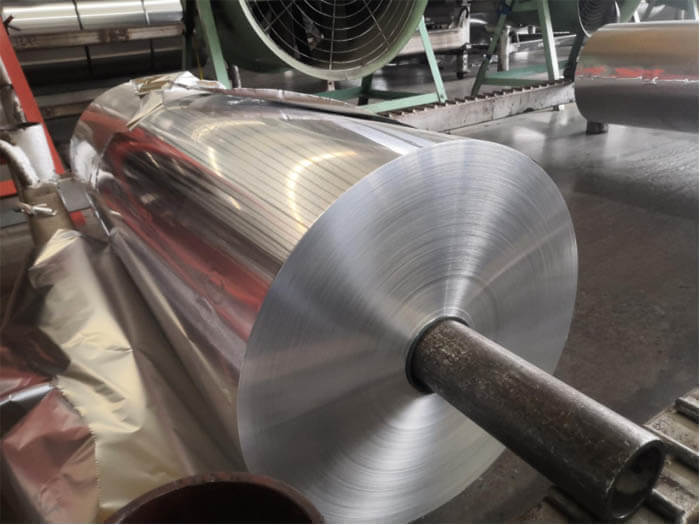
Main Technical Indicators of Coated Air Conditioner Aluminium Foil
- Plate Shape: Essential for the production process, requiring a good plate shape.
- Coating Performance: Includes coating thickness, adhesion, hydrophilic performance, and corrosion resistance, especially for hydrophilic aluminium foil.
- Coating Thickness: Should be controlled below 3/1m to affect the coating’s performance indicators.
- Coating Adhesion: Represents the firmness of the coating to the aluminium foil, impacting product stability during processing and use.
- Hydrophilic Property: The affinity of the aluminium foil surface to water, evaluated by the contact angle.
- Corrosion Resistance: Includes alkali resistance, salt spray corrosion resistance
FAQs About Aluminium Foil for Air Conditioners
Q1: What is the recommended thickness of aluminium foil for air conditioners?
A1: The ideal thickness depends on the application, but typically ranges from 0.08mm to 0.2mm.
Q2: Can I customize the coating on aluminium foil?
A2: Yes, we offer various coatings, including hydrophilic, anti-corrosive, and blue coatings, to meet your needs.
Q3: What alloys do you offer for air conditioner aluminium foil?
A3: We offer alloys such as 1100, 8011, and 3102 for HVAC applications.
Q4: Is your aluminium foil eco-friendly?
A4: Yes, aluminium foil is 100% recyclable, making it an environmentally friendly choice for air conditioning systems.
